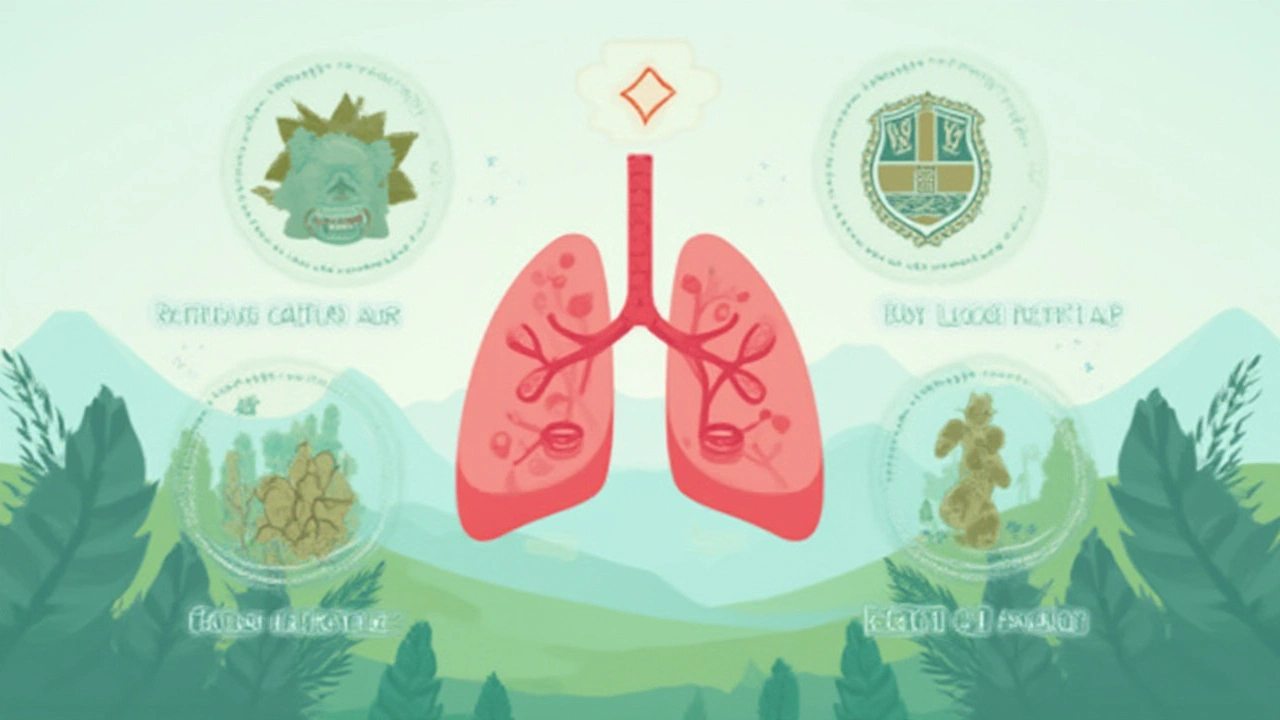You don’t really think about your lungs until they start acting up. Maybe you catch your breath walking up the stairs, or you’re coughing your way through yet another cold. That’s the point when you start searching for something – anything – to help you breathe easier. Lately, everyone seems to be buzzing about Lungmoss dietary supplements. Is this stuff for real? Or just another bottle on the shelf making big promises? Get ready for the real story, because there’s more to Lungmoss than slick marketing. UK shops are stocking up, reviews are popping up everywhere (and not all of them are glowing), and if you’re like me, you probably want to know what’s hype and what’s science. The next few minutes might surprise you.
What Exactly Is Lungmoss? Plant Power with a Curious Backstory
Lungmoss, despite the name, isn’t exactly a moss. In fact, we’re talking about plants from the genus Lobaria, and you’ll sometimes see it called Lungwort or Lung Lichen. These weird-looking leafy bits have been hanging out in damp forests all over Europe, including the UK’s own old-growth woods in Scotland and Wales. Back in the day, herbalists believed if a plant looked like an organ, it could help that organ – that’s why Lungmoss got its name. Cut it open, and it does kind of look like lung tissue. Spooky, right?
But folklore only gets you so far. Modern supplement companies grind this lichen down, pop it into capsules or tinctures, and claim it’s a game changer for everything from breathlessness to winter bugs and even pollution woes. Some formulas add extra herbs like thyme or mullein – sometimes the pure Lungmoss lichen, sometimes mixed with other ‘lung-friendly’ botanicals. If you check a label, look for the Latin name (usually Lobaria pulmonaria or similar) and verify you’re actually getting what you paid for.
One quirky thing: Lungmoss almost went extinct in bits of the UK because of air pollution, but it’s making a comeback as people become more eco-conscious and forests get protected. That’s a testament to its reputation for hardiness.
How Does Lungmoss Supposedly Help with Respiratory Health?
Here’s where things get interesting. Old-fashioned herbalists swore by lungwort for soothing coughs, clearing mucus, and helping people who spent all day around wood fires or city smog. These days, fans claim Lungmoss supplements can:
- Make it easier to cough stuff up (mucolytic effect)
- Calm mild inflammation in the airways
- Make your chest feel less ‘tight’ if you live in a polluted city or suffer hay fever
- Protect lung cells from oxidative stress caused by smoke or even viruses
But let’s not get ahead of ourselves. The truth is, there’s not exactly a mountain of hardcore scientific research on Lungmoss supplements. A study from the University of Tartu (Estonia, 2019) shows lungwort extracts might have mild anti-inflammatory properties. Another piece of research, from Poland in 2021, found that Lobaria extracts could slow down some bacteria that mess with the lungs, but these were just test-tube studies. No huge, gold-standard clinical trials with real live people yet. The EU has regulations about health claims on supplements, so don’t buy into wild stories about miracle cures.
Still, Lungmoss is packed with stuff like polysaccharides, lichen acids, and small doses of antioxidants – all things that, theoretically, could be good for respiratory linings. In some traditional European pharmacies, you’ll even find it as a herbal tea for cough support.

Important Facts, Real-Life Tips, and Potential Side Effects
Okay, so should you rush out and grab some Lungmoss? Not so fast. For one, sustainability matters – real Lungmoss is hard to harvest without trashing rare forests. If you do want to try it, always look for trusted companies who show how they harvest, check their packaging for eco-certification, and be suspicious if it’s suspiciously cheap.
You’re probably wondering if it’s safe. Luckily, for most healthy adults, taking commercial doses of Lungmoss supplements seems pretty harmless—at the amounts you’d get in a capsule or tincture. If you’re pregnant, breastfeeding, on blood thinners, or have serious lung diseases (like asthma or COPD), check with your doctor. Lungmoss can interact with some meds, and we really don’t know how it affects kids.
Daily users say the biggest thing they notice is easier breathing after mild coughs and less throat irritation in the winter. That said, side effects can include mild tummy upset, allergies (if you’re prone to them), and, on rare occasions, a skin rash. Swallowing large amounts, or using raw Lungmoss instead of a processed supplement, isn’t a smart move – lichens can carry pollutants from their environment. Stick to pharmaceutically prepared products instead of doing your own foraging.
If you like data, check out the table below for some useful info on Lungmoss supplement basics:
| Product type | Standard dose (adult) | Known benefits | Possible side effects | Precautions |
|---|---|---|---|---|
| Capsule/extract | 250–500 mg per day | Mucous relief (mild), mild cough support | Tummy upset, mild rash | Avoid in pregnancy/children; check for allergies |
| Herbal tea | 1–2 cups daily | Soothes throat, may ease minor coughs | Rare nausea, allergy | As above; use commercial blends |
One real tip: If you’re adding Lungmoss to your routine, start with the lowest dose and see how your body feels. And don’t swap it in for doctor-prescribed medications without a serious consult—especially if you’ve got a diagnosed respiratory condition.
Comparing Lungmoss to Other Natural Lung Support Supplements
People love to compare. How does Lungmoss stack up against famous picks like mullein, thyme, or even eucalyptus? Each herb brings its own reputation and science:
- Lungmoss supplement: Mildly soothing, with a long track record in European herbal traditions. Not a quick fix, but potentially helpful for supporting daily lung comfort, especially in pollution-heavy cities.
- Mullein: Often featured in cough syrups, teas, and even chest rubs. Slightly more research behind it, especially for easing congestion. Usually well-tolerated, but high doses can upset digestion.
- Thyme: Think more classic cough remedy. It’s rich in thymol, which helps thin mucus and tastes pretty good in a tea blend. People with sensitive stomachs sometimes react.
- Eucalyptus: The classic menthol smell you get in steam rooms, chest balms, and lozenges. Strong, but not always safe for young children. Can open up the nose, but not a direct lung tonic.
If you’re just looking to gently support your lungs through winter or city life, Lungmoss is a gentle option. If you’re after heavy-duty decongestants or need something to tackle a hacking cough, you might reach for one of the others. A lot of blends include two or three of these together, aiming to catch all the bases. Always check if the formula is right for your situation—don’t fall for the “one magic herb to rule them all” trick.

Is Lungmoss Right for You? How to Use It Safely and Get the Most Out of It
So, you like the sound of Lungmoss and want to give it a go? Here’s how to do it sensibly:
- Choose products from brands that show independent lab results, preferably UK-made and third-party tested.
- Start with just one Lungmoss product at a time. Monitor any new symptoms for a few days.
- Create a routine: Pair with a warm herbal tea or take after food if you have a sensitive stomach.
- Don’t expect instant miracles. Most users see the mildest boost in comfort or less throat irritation after a week or two—and only if their lungs are already in pretty good shape.
- Combine Lungmoss with real-world lung care: regular exercise (think brisk walking or cycling in clean air), staying hydrated, not smoking, and using air purifiers indoors if you’re in the city.
- If you notice any new skin rashes, persistent stomach upset, or your breathing gets worse, stop and talk to your GP.
- Remember, supplements like this aren’t replacements for asthma inhalers, antibiotics, or vaccines. Think of Lungmoss more like a gentle assistant than a superhero.
Want a practical tip? If you’ve got allergies, check if the Lungmoss product is blended with anything you’re sensitive to, like chamomile or pollen-rich herbs. Don’t be shy about messaging the brand – the good ones will answer back with ingredient lists and sourcing info.
Breathing might feel like a basic thing, but thousands of things can muck it up: dust, diesel fumes, cold weather, or just a bad season of colds going around. Trying Lungmoss as a supplement can be one more tool in your kit – not a miracle, not a myth, but a piece of what could be a more comfortable winter season. Just be smart, start slow, and listen to your body. Sometimes, that gentle “old man’s beard” from the forest brings a little bit of relief to city lungs, if you use it the right way.
